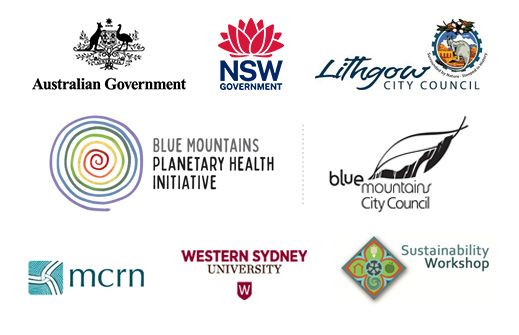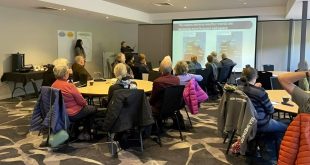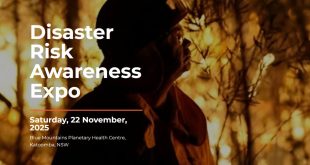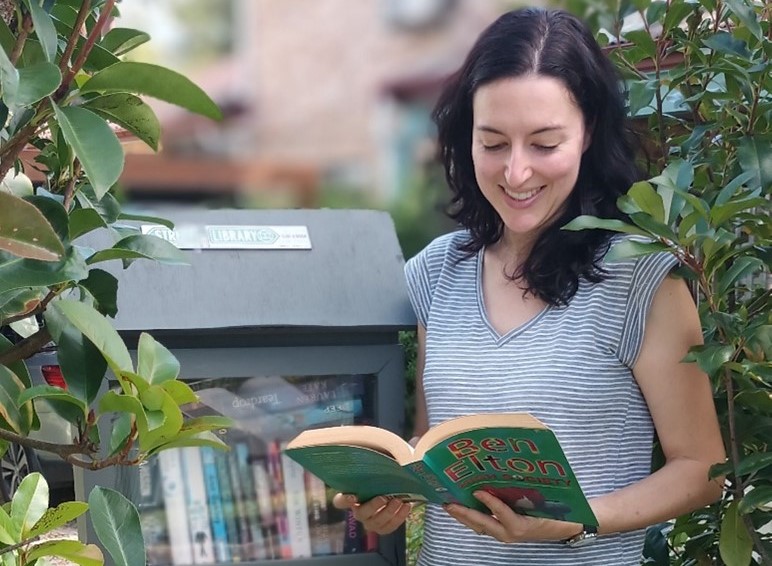
Nikki Mahony enjoys one of the books from her Street Library, providing free books to all in her street and beyond. (Photo: Gabiann Marin)
Story by Gabiann Marin
The gift economy is a win-win-win for people and their communities, preventing waste while saving money and building community goodwill. What’s not to love? Explore the options for giving and receiving in the Springwood area and the Blue Mountains more widely in this story by Gabiann Marin.
Key Points:
- The gift economy is a parallel cultural economy that values things exchanged without monetary value but with strong connection to gratitude and reciprocity.
- A gift economy benefits the community by creating a culture of care and sustainability which can help people feel great about themselves and others.
- There are a number of free and accessible ways to engage with the gift economy including street libraries, Pay It Forward groups and offering goods free to the local community.
Receiving a gift usually feels great. More often than not, the sense that someone has given us something without expecting a monetary reward, raises our sense of self-esteem, fills us with gratitude and makes us feel more connected to the people who gave us that gift.
A great deal of research suggests that the act of GIVING a gift can also boost our sense of happiness and fulfilment, almost as much as receiving one. The simple act of giving, whether it be items, money or time, actively stimulates the brain’s reward centre, the part of the brain that releases endorphins, which gives us a feeling of intense happiness. This has been called a ‘helper’s high’. Other studies suggest that the act of giving also decreases stress and thus improves overall health.
Perhaps the most beneficial and unrecognised impact of giving is that it encourages a community culture of generosity and kindness, where acts of care are then repeated and reciprocated, strengthening communities and relationships and building a world where we care about ourselves and others.
Perhaps it is these amazing benefits which explain why the spontaneous act of giving something away for free has become so prevalent across our community: not just during traditional times of gift giving, but through everyday random acts of kindness and generosity for friends, family and even strangers.
The Gift Economy
This phenomenon of free giving has a name and definition, it is called the Gift Economy and relates to the ways we find to create systems of exchange which don’t require monetary transactions. These exchanges create value that goes into communities through the recycling of goods, reduction of waste and the cultural shift towards giving and receiving rather than simply buying and selling.
Philosopher Charles Eisenstein sums it up in his book The Ascent of Humanity when he states: “The gift economy signifies a shift from consumption to contribution, from transaction to trust, scarcity to abundance and isolation to community.”
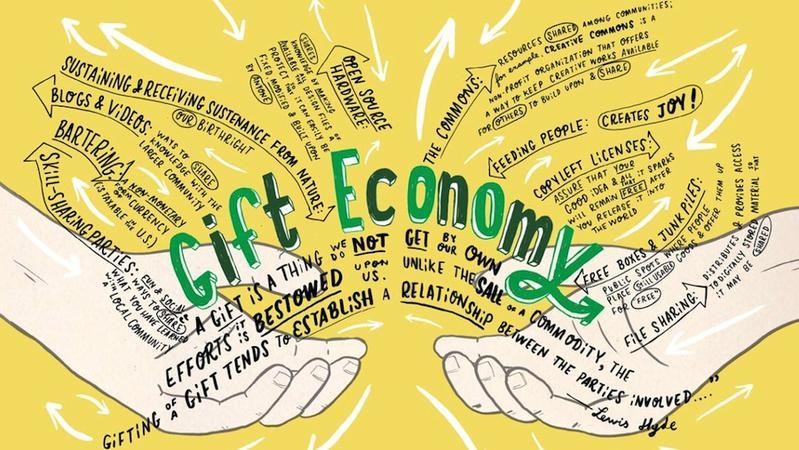
The Gift Economy is already being created by local communities in Springwood and beyond. (Photo: Creative Commons license 2.0)
Even, and perhaps more importantly, in times of difficulty and stress, engaging in the gift economy can completely change our outlook on the world and contribute to a more sustainable, affordable and circular economy.
Not that the people of the Blue Mountains need much encouragement to be generous! All around us we can see examples of gifting where goods and services move throughout the entire community: gifts passed on, returned and ‘paid forward’ in an infinite cycle.
Nikki Mahony lives in this world of generosity, quite literally. Almost everything in her Springwood home has been given to her as a gift, provided free through the kindness of friends, relatives and strangers. It’s not that Nikki and her husband Paddy couldn’t have bought these things, it’s that they see the value in accepting gifts, both as ways to appreciate and strengthen relationships between them and those who gave the gifts, and as a way to prevent perfectly lovely items going into landfill.
By giving away items that are not needed, and accepting gifts of those which are, Nikki and her family, and countless others like them, are helping to reduce the numbers of items that are tossed away or left to rot in garages and cupboards.
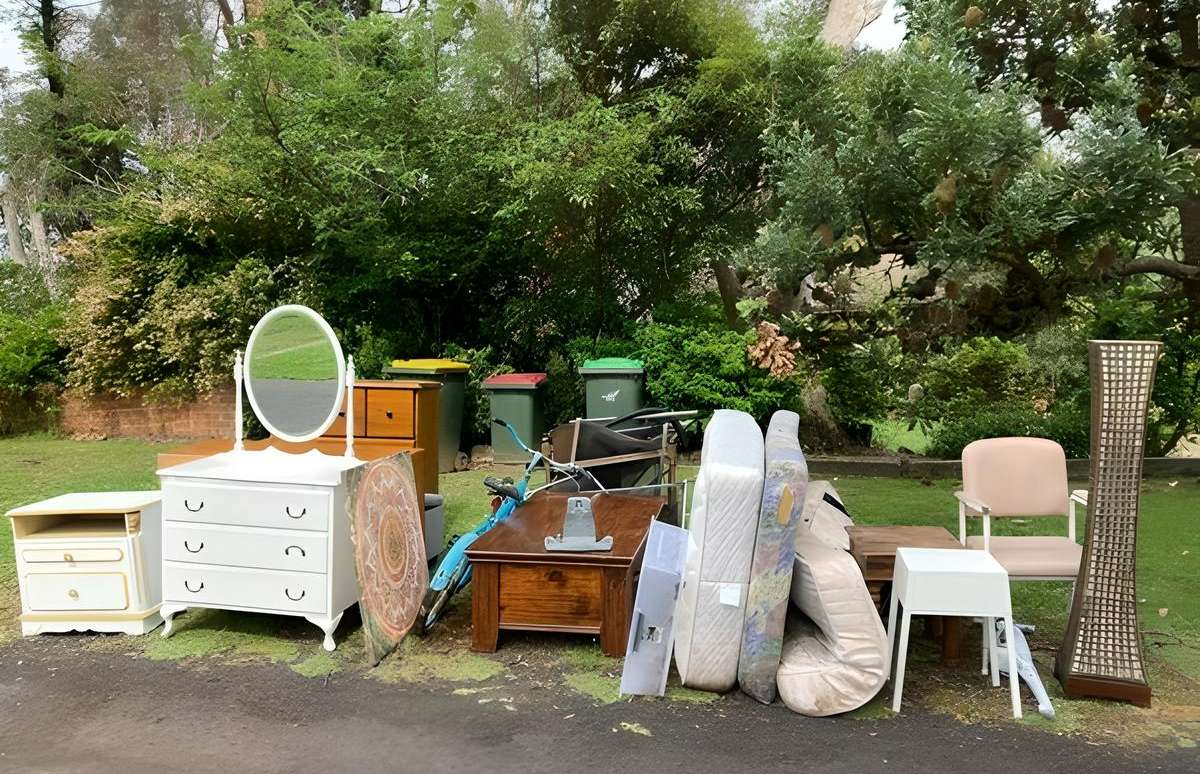
Street Bounty on Facebook lets people know where they can pick up unwanted items left on local streets. NB. It is important to consider risks that can occur with rummaging and to behave respectfully, not blocking pedestrian or vehicle access and making sure you leave things better than you found them. Items left outside someone’s property are their responsibility so don’t add your stuff to theirs. (Photo: courtesy Street Bounty Blue Mountains)
The gift economy is not just about getting free stuff, it is a way to actively contribute to a circular economy where goods are defined by a sense of appreciation and gratitude, not just a price tag.
“A gift, well you value it more,” Nikki explains, “and you feel like there is a debt that needs to be repaid.”
The psychology of the gift economy is defined by this idea of giving back. A gift is, by nature, reciprocal and as such there is a relationship which is formed when receiving one. Gratitude is created and that gratitude is then returned in a variety of ways. In some cases the gift is used then passed on, other times a different gift is paid forward to an organisation or individual, but often the gift is accepted in order to give to someone else.
Joan*, another Springwood resident who uses a number of free gifting systems, agrees. “Sometimes people worry that because they didn’t spend money on something, the person who they give it to won’t appreciate it. But my family always appreciates a gift. It’s more meaningful than me going out and buying something new that wouldn’t have a great story or history attached to it.”
“We appreciate every gift,” Nikki says, indicating the beautiful antique wooden chairs and good quality children’s toys that sit upon them, both gifted by a relative. “But sometimes we can’t use something we are given, or we only need it for a short time, so if we don’t need it, well we have an obligation to gift it to someone else who could. We got it for free so it’s only right to pass it on.”
Street Libraries
Nikki recalls her first real use of a street library was to give books to one of her students. Nikki found some class readings in a street library and got them specifically so he could have his own copies.
Despite Nikki accessing the street library for someone else, she felt an obligation to pay back for the generosity she had accessed.
“I feel like, obligated now, to fill up other people’s street libraries,” Nikki smiles. “I have like a personal rule, for everything I take, I have to give something back.”
Nikki returned to the street library and deposited books for others to enjoy, but, years later, she is still continuing the cycle of reciprocity started all those years ago, by hosting a street library of her own.
A neighbourhood street library is a book exchange program, hosted by individuals, designed to keep books freely circulating throughout the community. The street libraries are often characterised by beautifully painted free-standing cabinets outside the front of a house like the library in Shirlow street, Faulconbridge, decorated with a beautiful rosella painting by artist Will Crocker, who also donated his time and skill to create it.
Street libraries offer a range of books available to anyone who would like to take one and open to any who would like to drop off books to be distributed. Unlike a regular library the book does not need to be returned, and anyone can stock the library with books to pass on.
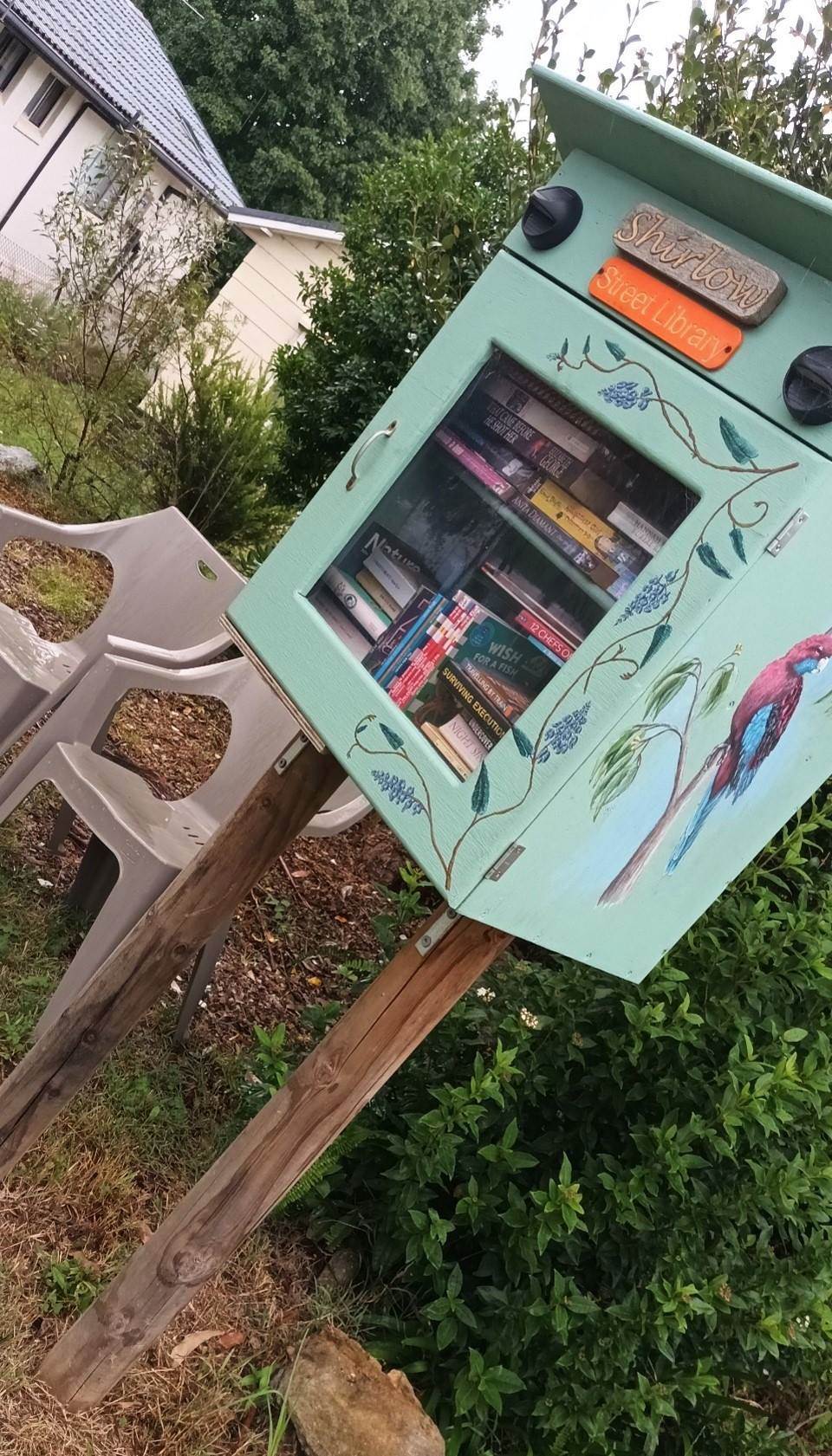
The Shirlow Street Library in Faulconbridge is an artistic collaboration, built by local craftsman Tony Glynn and painted by artist Will Crocker. (Photo: Gabiann Marin)
Christine, a local Faulconbridge resident and host of the Shirlow Library says: “Gifting is good for individuals and communities. We circulate and reuse things, and that extends their useful life and helps the environment by reducing waste.”
Christine is part of the Springwood Community Garden and Blue Mountains Bush Care and has a commitment to sharing and caring for community in different ways, but is particularly proud of what the Shirlow Library means for the locals around her, many of whom have written to thank her for her generosity in providing it.
“We love the Shirlow library!” Angela, a Faulconbridge local, writes. “Highlight of our walks when my daughter can pick out a new bedtime story.”
A sentiment shared by Tegan who writes: “Forever thankful for your book library. The kids love it.”
Street libraries first began in 2015 in Sydney, Australia, when a man named Nic Lowe erected a book exchange box on his front fence in Newtown. The idea took off and has grown into an idea of sharing and generosity that stretches across every state and territory in Australia, demonstrating just how much Australians are willing to embrace a culture of sharing, sustainability and generosity.
Nic Lowe now runs the national Street Library Registry where those who have street libraries can add them to a national database to be easily found by their communities.
Nikki and Paddy, living in Newtown during that time, were witnesses to the positive social impacts of the street library in their local area and when they moved to the mountains, they were really pleased to be part of that tradition, buying a house which had an established street library out the front of it.
“When the house came on the market the street library wasn’t the only reason we bought it, but I liked the idea of having a house which had one.”
Nikki’s neighbourhood library is one of eighteen street libraries voluntarily registered in the Springwood and Surrounds area, with over 50 registered by the Street Library registry throughout the Greater Blue Mountains, as well as a number of independent street libraries which have not been registered on the site.
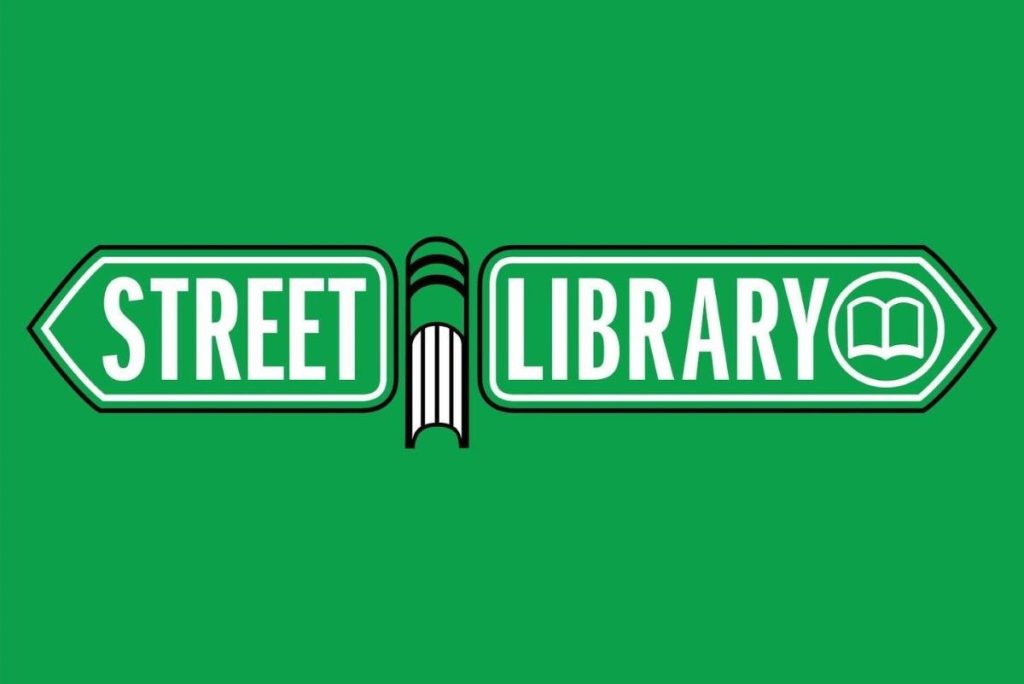
The National Street Library website can direct you to all the street libraries available across Australia, so wherever you are, you can find a free book to enjoy. (Photo: Creative commons 2.0)
Street libraries may be a common example of the gift economy, but as you delve deeper, you see that there are many other ways the ideals of generosity and gifting have been embraced by our community.
Online communities and the free economy
Unsurprisingly, Nikki is across a range of free and gifting sites and organisations where she regularly contributes and takes items.
“For me, it’s all about diverting things from waste,” Nikki explains, “and I have a fairly complicated algorithm to decide what goes where, to make sure it is getting to the right people. I do donate to charity shops and sometimes I sell an item, but I don’t feel good about selling something or giving something to someone else to sell, if I got it for free, you know.”
Nikki has used Blue Mountains Pay it Forward and Freecycle sites on Facebook to rehome unwanted items across the community and both sites are extremely active, with people all over the Mountains offering things they no longer need to others who could use them. The sites all have slightly different rules of engagement but the underlyng ideal is that items must be offered for free and that those accepting them cannot use them for economic gain.
Joan*, who works for the Red Cross, is a huge advocate for donating items to charity shops but she also often uses and recommends the Pay it Forward Facebook group, having used it extensively after her parents passed away and she needed to find homes for all of the items left in their shed and garage.
“It was very difficult to think about what kind of value to put on these things. They were sentimental, but also very specific, like a car manual for a 1930’s Morris Minor. I knew someone would want it, but didn’t know how to find them. The Pay It Forward sites have been fantastic for moving these things into other homes.”
Like so many who use these free services, Joan believes that it is a great alternative to simply throwing things away, it’s also a great way to source things you don’t need for a long period of time. As a grandmother, she found the gifting sites valuable when trying to source things for her grandchildren: like change tables and prams.
“I ended up with three change tables,” Joan admits laughing, “but that’s okay because I can just pass it through to other grandmothers, and when I don’t need it any more it goes back onto the Pay It Forward and another person can use it. If it wasn’t for the free sites I probably would have ended up having to buy cheap rubbish and then what: throw it away? This way I have kept things out of landfill and avoided buying more new stuff which we don’t need.”
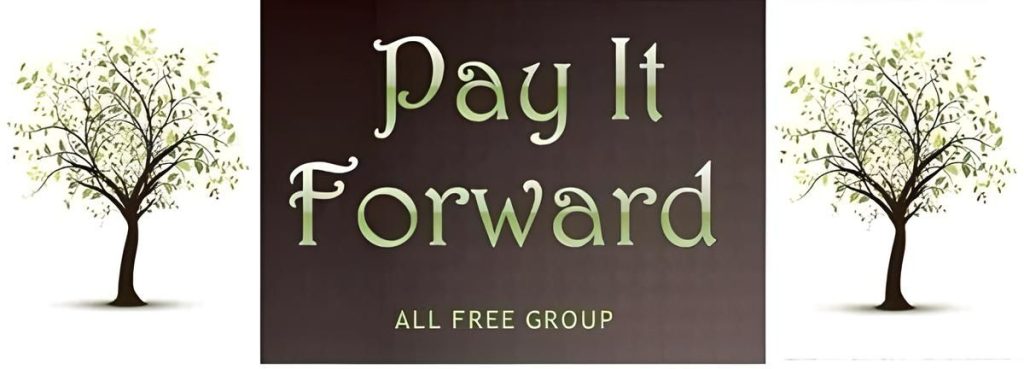
Pay it Forward Blue Mountains Facebook group is a great way to find things you need and pass on things you don’t. (Photo: courtesy Pay it Forward Blue Mountains)
The ability to use and reuse gifted items for no cost benefits everyone, but Joan notes that renters and young families trying to start out may really benefit the most from the whole process.
“My daughter has had to move a number of times, she is now in Melbourne, and she used a Pay It Forward site to furnish her whole house. It’s been so helpful for her and she will gift it all back when she leaves. It’s brilliant.”
Other ways to source free goods is through Street Bounty, an online group which shares information about items placed on the street which could be picked up and reused, a great way to stop often good quality items from ending up in council dumps and landfill.
Nikki and Joan both also access community swap groups for kid’s toys and clothes, items which often only need to be kept for a few months or a year before they are no longer needed. There are even local community pages where people commonly offer free items like unused groceries or household items to their neighbours.
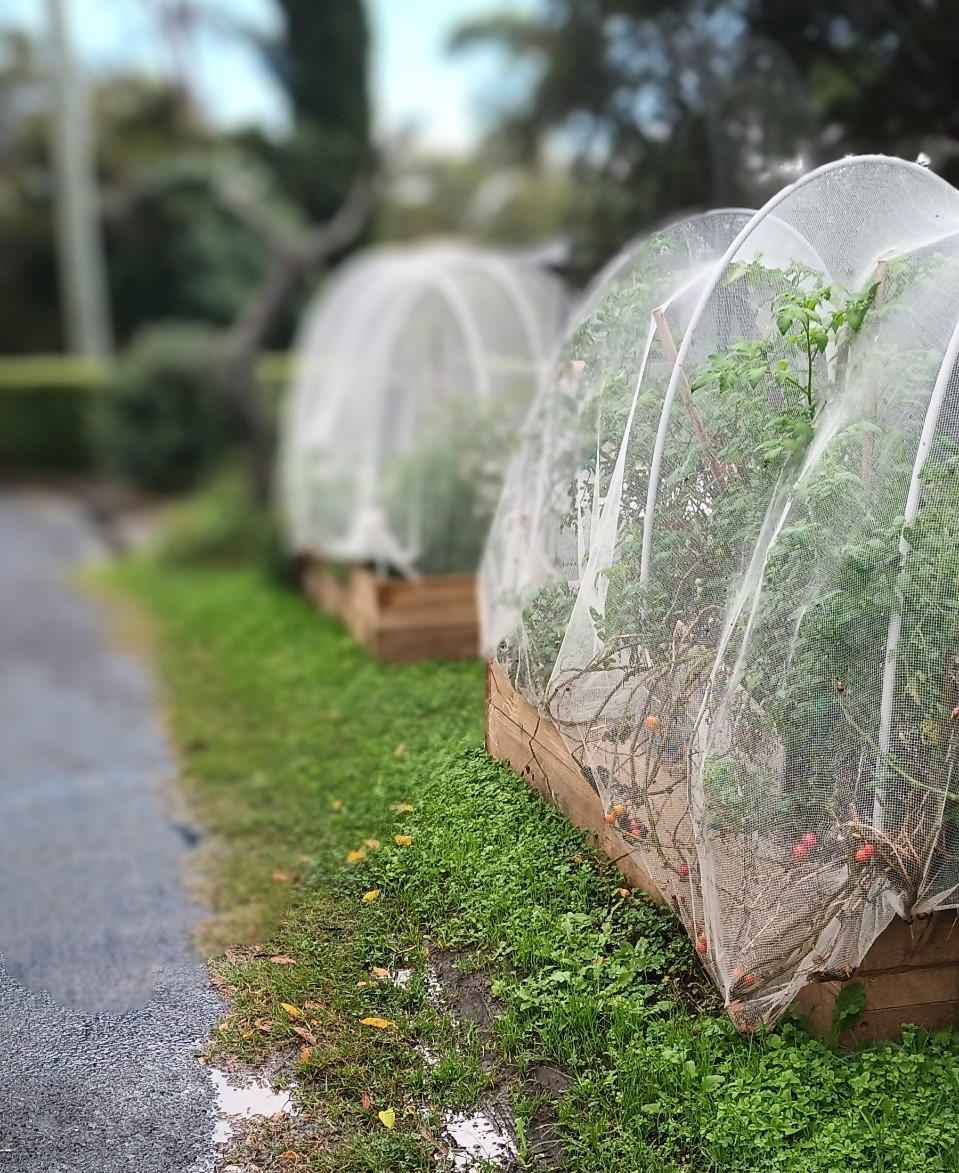
The Faulconbridge Street Garden offers tomatoes and other edible delights for neighbours to freely enjoy. (Photo: Gabiann Marin)
Other more innovative ideas include a local Faulconbridge Street Garden where neighbours are encouraged to come and pick tomatoes, cucumbers and other veggies provided by the resident, Katie, on the nature strip in front of her house.
Other gardens across Springwood, Winmalee and other suburbs routinely offer boxes of fruit and vegetables for neighbours to take freely and even those without their own market gardens commonly share food with others through the food donation receptacles in Springwood IGA. The regular Springwood Crop Swap allows anyone to exchange excess produce from their garden with others who have extra carrots, lemons or eggs.
Even local businesses have embraced the gift economy, providing ways for community to share with each other. Local café Finn and Co on Macquarie Street, Springwood, offer a Pay it Forward board where customers are able to buy a voucher for a meal, drink or afternoon tea and place it on the board for another person to enjoy.
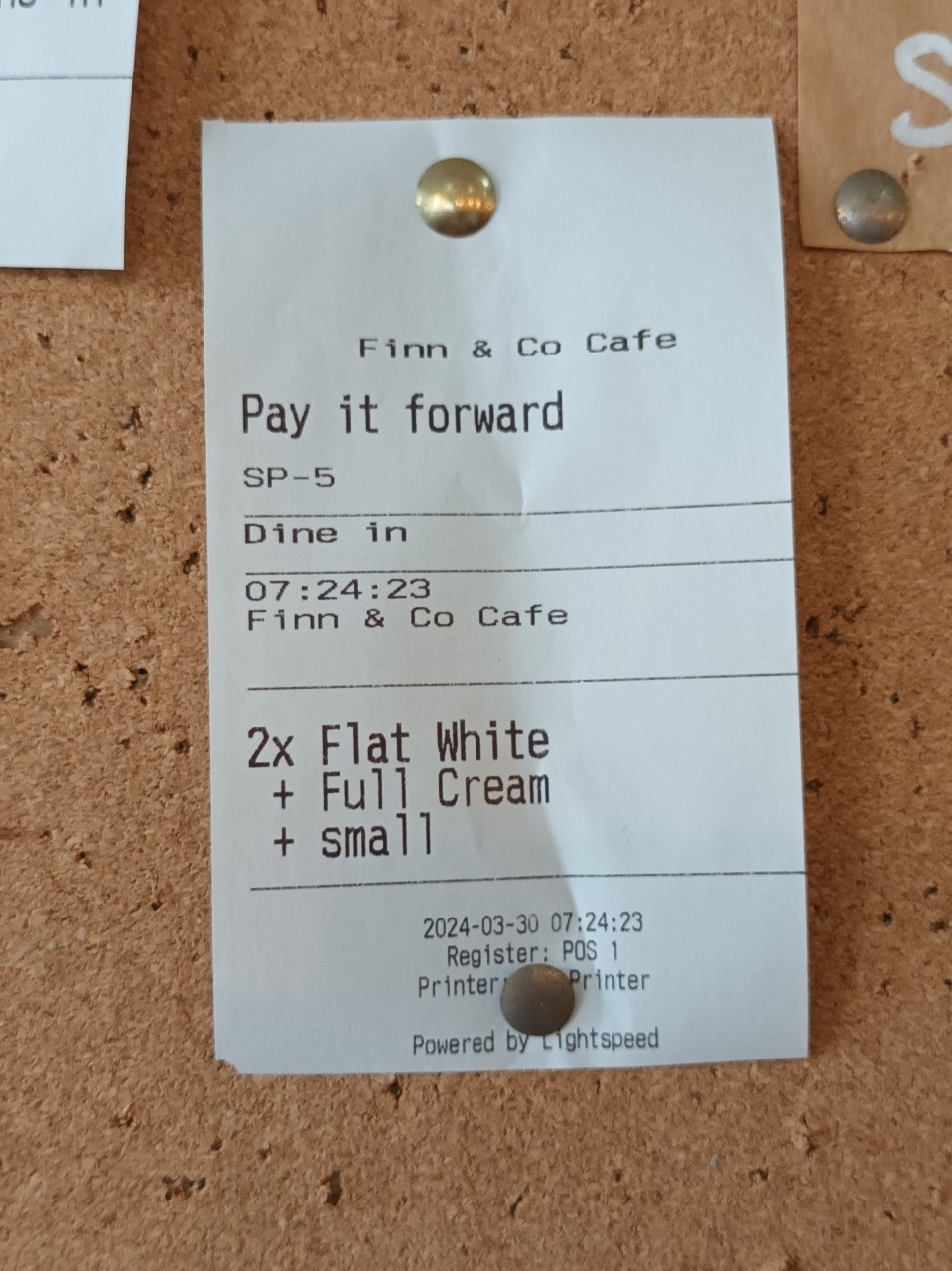
At the Finn and Co Café anyone can access a free meal or drink provided by another generous customer.
Despite the idea that the economy around us is dominated by a more capitalistic, self-serving and transactional culture, our community has shown that the gift economy runs strong: creating invisible, but important bonds within neighbourhoods, communities and societies that support sustainability, reciprocity and generosity.
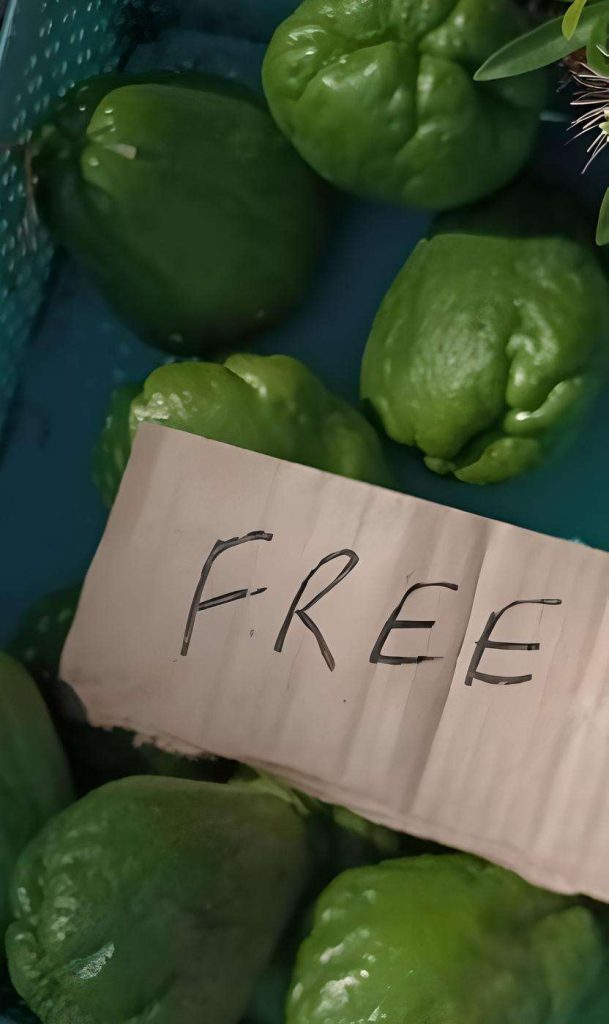
*Author’s note: Some names in this article have been changed by request for personal privacy reasons.
Take Action:
There are so many ways to engage in the gift economy and be part of a community culture of sharing and reciprocity. Here are some good ways to start:
- Instead of tossing out items you no longer need, list them on free exchange Facebook groups like:
- Source items you need to buy through these sites rather than buying new.
- Take items to community swap events like the Kids Clothing and Toy Swaps run by Parents for Climate Blue Mountains and Crop & Swap events hosted in your local community.
- Use your local street library and leave books you have read for other community members to enjoy – or even think about setting up your own street library for your local neighbourhood if there isn’t one near you. You can find out where they are and how to build one here https://streetlibrary.org.au/
- When booking a Council pick-up, take photos of the items and post them and your location in the Street Bounty Facebook group or on your local neighbourhood notice board ahead of time so people have the chance to claim them before they are collected – noting that Council only allows items to be place at the kerb on the day before the collection date. And if you see items on the side of the road why not take a quick photo and let the Street Bounty community know it’s there.
- If you can, why not add a bit extra to your shopping and donate it through the donation bins provided in the local IGA Springwood store.
Share this article:
This story has been produced as part of a Bioregional Collaboration for Planetary Health and is supported by the Disaster Risk Reduction Fund (DRRF). The DRRF is jointly funded by the Australian and New South Wales governments.
